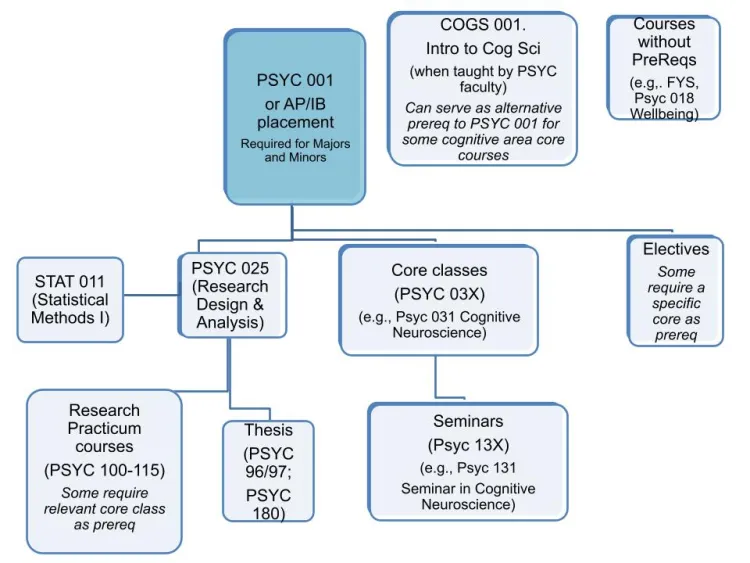Majors & Minors
Course Major
A course major must include at least 8 credits in psychology. One additional credit is required in statistics as a prerequisite for PSYC 025.
Normally, one credit of the 8 credits in psychology may be accepted from a semester abroad. The minimum requirement excludes courses cross-listed in psychology that are taught solely by members of other departments, such as EDUC 021/PSYC 021, EDUC 023/PSYC 023 and EDUC 026/PSYC 026. COGS 001 Introduction to Cognitive Science may be counted in the minimum courses required for the major when taught by a member of the psychology department.
A typical sequence of courses toward a major begins with PSYC 001 Introduction to Psychology (or equivalent), followed by a core course (those with numbers in the 30s) or PSYC 025 Research Design and Analysis.

Requirements
1. PSYC 001 Introduction to Psychology (or equivalent) is normally a prerequisite for all courses in psychology (see the note about prerequisites above).
2. PSYC 025 Research Design and Analysis is a requirement for the major. Note that STAT 011 Statistical Methods (or equivalent, e.g., ECON 031) is a prerequisite for PSYC 025, or may be taken concurrently.
3. At least four core courses in psychology are required (those with numbers in the 30s): 030 Behavioral Neuroscience; 031 Cognitive Neuroscience; 031A Social, Cognitive and Affective Neuroscience; 032 Perception; 033 Cognitive Psychology; 034 Psychology of Language; 035 Social Psychology; 036 Thinking, Judgment and Decision Making; 037 Multicultural Psychology; 038 Clinical Psychology; 039 Developmental Psychology.
4. Finally, to graduate with a major in psychology, students must also complete a culminating research experience, described below.
Comprehensive Requirement: Culminating Research Experience
Students in the Course Program must satisfy the College's comprehensive requirement in their majors. In psychology, this can be done in one of the following four ways:
1. Complete a research practicum in psychology in the senior year: PSYC 101 Research Practicum in Political Psychology; PSYC 102 Research Practicum in Cognition and Perception; PSYC 103 Research Practicum in Behavioral Neuropharmacology; PSYC 104 Research Practicum in Language and Mind; PSYC 105 Research Practicum in Psychology and Neuroscience: Social Imitation; PSYC 106 Research Practicum in Cognitive Development; PSYC 107 Research Practicum in Developmental Psychology; PSYC 108 Research Practicum in Clinical Psychology; PSYC 109 Research Practicum in Social and Emotional Well-Being; PSYC 110 Research Practicum in Cognitive Neuroscience and PSYC 111 Research Practicum in Multicultural Psychology. Students may enroll in these practica to conduct original empirical research for one-half (an option for some practica) or one credit, and may take these courses before the senior year without meeting the comprehensive requirement. When taking these courses to meet the comprehensive requirement, the student will normally enroll for one credit and participate in the Senior Research Poster Session.
2. Complete PSYC 096-097 Senior Thesis. Admission to the senior thesis program is by application only. Enrollment in 2 credits of senior thesis, one each semester of the senior year, is required. Normally, a B+ average in Psychology and overall is required for acceptance into the thesis. Application to the senior thesis program is usually made by mid-April of the junior year. The list of faculty research interests on the department's website will help students identify the appropriate faculty member to consult when developing thesis plans.
3. Complete a Senior Field Placement in Clinical Psychology (PSYC 090) in the spring semester of the senior year. Extensive planning in advance is necessary. See the PSYC 090 description.
4. Complete PSYC 098 Senior Research Project. With the approval of the faculty, students may select a topic of their choice in psychology and write a substantial paper on the topic based on library research-and possibly some original empirical research. The paper may constitute a significant expansion and extension of a paper or papers written by the student previously for psychology courses, or it may address a topic on which the student has not written before. Students are encouraged, but not required, to select topics that span more than one content area in psychology. In addition to submitting their written reports, students participate in the Senior Research Poster Session. Students receive either one-half or one course credit for satisfactory work on the Senior Research Project, and a letter grade is assigned. Students normally enroll in the course in the fall semester. A Psychology Faculty Member must agree to supervise student before enrollment.
Acceptance Criteria
To be accepted as a course major, students must have successfully completed two courses in psychology and be in good standing at the College.
Course Minor
A course minor in psychology requires a minimum of 5 credits taken with psychology faculty at Swarthmore. There is no comprehensive requirement.
Requirements
PSYC 001 Introduction to Psychology (or equivalent) is normally a prerequisite for all courses in Psychology (see the note about pre-requisites above).
A minimum of two core courses in psychology (those with numbers in the 30s) is required: 030 Behavioral Neuroscience; 031 Cognitive Neuroscience; 031A Social, Cognitive and Affective Neuroscience; 032 Perception; 033 Cognitive Psychology; 034 Psychology of Language; 035 Social Psychology; 036 Thinking, Judgment and Decision Making; 037 Multicultural Psychology; 038 Clinical Psychology; 039 Developmental Psychology.
*Note: COG 001: Introduction to Cognitive Science may count towards the completion of a Psychology Minor, though not as a core course, when taught by a Psychology Faculty Member.
Acceptance Criteria
To be accepted as a course minor, students must have successfully completed one course in psychology and be in good standing at the College.



